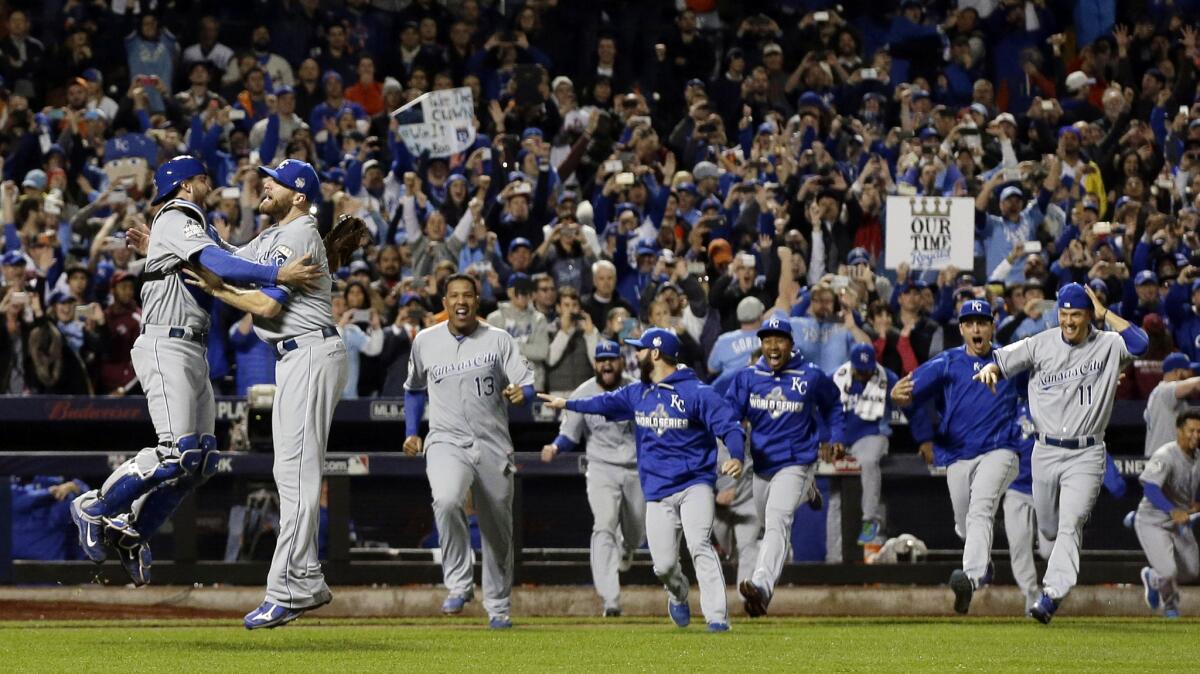MLB AM/PM: It’s a royal argument

Kansas City Royals catcher Drew Butera and Wade Davis celebrate after defeating the New York Mets, 7-2, in Game 5 of the World Series on Nov. 3.
- Share via
Pedro Moura (PM), who covers the Angels, and Andy McCullough (AM), who covers the Dodgers, have views on some baseball topics as different as night and day. In the first of a season-long series, they debate a trending baseball topic in an email exchange. For starters, AM/PM discuss the true meaning of “winning” baseball.
Pedro Moura: In baseball, I care very little for what has happened in the recent past. I care more about what will happen. Who won something last season gives me little indication about who might win something this season.
Every day when he arrived at Dodger Stadium in 2014, Dee Gordon put on a shirt that read, “Trust The Process.” I’m aware of how poorly that phrase plays across society. Russell Wilson says it all the time. But it worked for Gordon, who improved his batting average 100 points in three years, and it’s always a necessary reminder to a results-obsessed fan base.
Four years into his tenure as Kansas City’s general manager, Dayton Moore said that his process always envisioned the Royals winning the World Series in eight to 10 years. At the time, that statement was poorly received. It turned out to be true. And now, in determining our Royals expectations for 2016, we must evaluate whether their process remains.
See the most-read stories in Sports this hour>>
In recent decades, few small-market teams have been able to win without a prolonged process. Although they play in anything but a small market, the Dodgers have essentially picked process over results, too. They could afford to sign Zack Greinke. But doing so would have gone against their — get this — process, where aging players are eschewed and youth reigns.
It’s not so much that process is the more joyful approach. It is that, many times, results produce misleading information, and many times, judging by results will force out the more forward-thinking decision makers in favor of executives focused on the immediate.
There is so much noise in baseball. Judging on results alone leads to the acceptance of it.
Andy McCollough: Well good morning, Pedro. It’s nice to hear from you. It’s good to see you are properly caffeinated and missing the point.
You brought up Dayton Moore’s Process. That was considered a punchline until a strange thing happened: The Royals started winning. You can argue that Moore had the right idea all along. But if the Royals don’t reach the playoffs in 2014, no one would be listening.
I feel like a schism happened among baseball observers within the last decade or so. A flashpoint was probably the 2010 San Francisco Giants. At some point, a certain sect of fans stopped caring about what had actually transpired on the field and decided what was more important was the inner workings of the front office. And that’s preposterous.
I’m all for praising baseball executives when they execute a well-considered, reasonable, creative plan to field their team. But if the team doesn’t actually win, who cares? Which leads to an interesting question, and we can limit this in scope to big-market teams like the Angels and the Dodgers: What constitutes “winning” for those clubs?
PM: Hi, Andy. Of course there are higher standards for the Angels and Dodgers. Hovering at .500 will never be acceptable in these markets.
But it is not as if either team’s season can be deemed a success if they do not win the World Series. I think it’s important to remember that what transpires once the postseason begins has been proven to be essentially random. Play a given postseason over a second time, scientists say, and you’re likely to achieve different results, another so-called winner.
So what constitutes winning here is consistent postseason qualification. I don’t think fans possess legitimate grounds for complaint if their team makes the playoffs six consecutive seasons and loses in the first round each year.
Of course, that is exceptionally unlikely. Do it enough times, and you will win. Don’t fret about coming one base short one year. If you do it again, eventually it will happen. Right?
AM: Pedro, I have a serious question: Who cares what scientists say about the postseason?
Yes, I understand that the postseason is a crapshoot. Life is a crapshoot. Life has a small sample size. But that doesn’t mean we should not celebrate those who succeed.
I understand that fans must recognize that this endeavor is not easy, and that the 29 other teams are trying, too (unless they are tanking, which is a debate for another time). But do you not feel there should be some level of discontent among, say, fans of the Atlanta Braves in the 1990s or the New York Yankees in the 2000s who saw their teams continually fail in the postseason? I think you can praise a team for its success in reaching the playoffs while still criticizing their performance once in the tournament.
The playoffs are a crapshoot, but they’re not actually a lottery. You’re allowed to win. Now, if you’ll remind me, how long do flags fly for?
PM: Celebrate those who succeed, please. But, to expand this to discussion to life like you did, celebrating only those who win the World Series is akin to celebrating only those who reach the executive level at their chosen workplace. There is more that matters. If you significantly surpass expectations, if you beat difficult odds — those feats constitute success and are worthy of celebration, too.
There is validity to your mention of the Braves and Yankees. I recognize the frustration those circumstances produce. But I think there is frustration in the recent Boston Red Sox situation, as well. They’ve made the playoffs once in six seasons. Sure, the time they made it, they won the World Series, but many fans would tell you the surrounding struggle has not been worth it.
I care what scientists say about most things. I was under the impression most of us did. Maybe I’m wrong.
And, yes, flags fly forever, Andy. Or until a stadium is built and they are uprooted and replanted.
AM: When was the last time the Dodgers built a stadium? And when was the last time a scientist won a title? I suppose Pau Gasol counts, as a medical school student.
As I mentioned earlier, you can praise a team for making the playoffs. But if you argue for process, the praise stops there. The Oakland Athletics accomplished plenty during the “Moneyball” era. They also won zero championships. You can hold both thoughts in your head, the praise and the criticism, at the same time.
I guess it depends, as a sports fan, on what you want out of this process. Would you rather be the Braves or the Red Sox? Would you rather be tortured by near-misses annually, or exultant in one magical year surrounded by seasons of abject failure?
I don’t know.
PM: Gasol is great. Don’t bring him into this.
I guess my side comes down to this: I don’t think near-misses are necessarily torturous. I think they can be wonderful in the right context. Had 2015 not happened, many Royals fans would have pointed to 2014 as the best year of their sport-fan lives.
I prefer the process to results because I hope that is how we all would be judged. We’ve all witnessed instances in our own lives where well-considered, reasonable, creative plans do not work the way we wanted. It’s a terrible feeling, and it’s one exacerbated when our competitors’ worst-laid plans come through.
Of course, best-laid plans can be futile. But what can we do beyond preparing the best we can and sticking to the process?
AM: The results aren’t random! Have you even been reading what I’ve written?
Follow Andy McCullough on Twitter @McCulloughTimes
Follow Pedro Moura on Twitter @pedromoura
More to Read
Go beyond the scoreboard
Get the latest on L.A.'s teams in the daily Sports Report newsletter.
You may occasionally receive promotional content from the Los Angeles Times.












